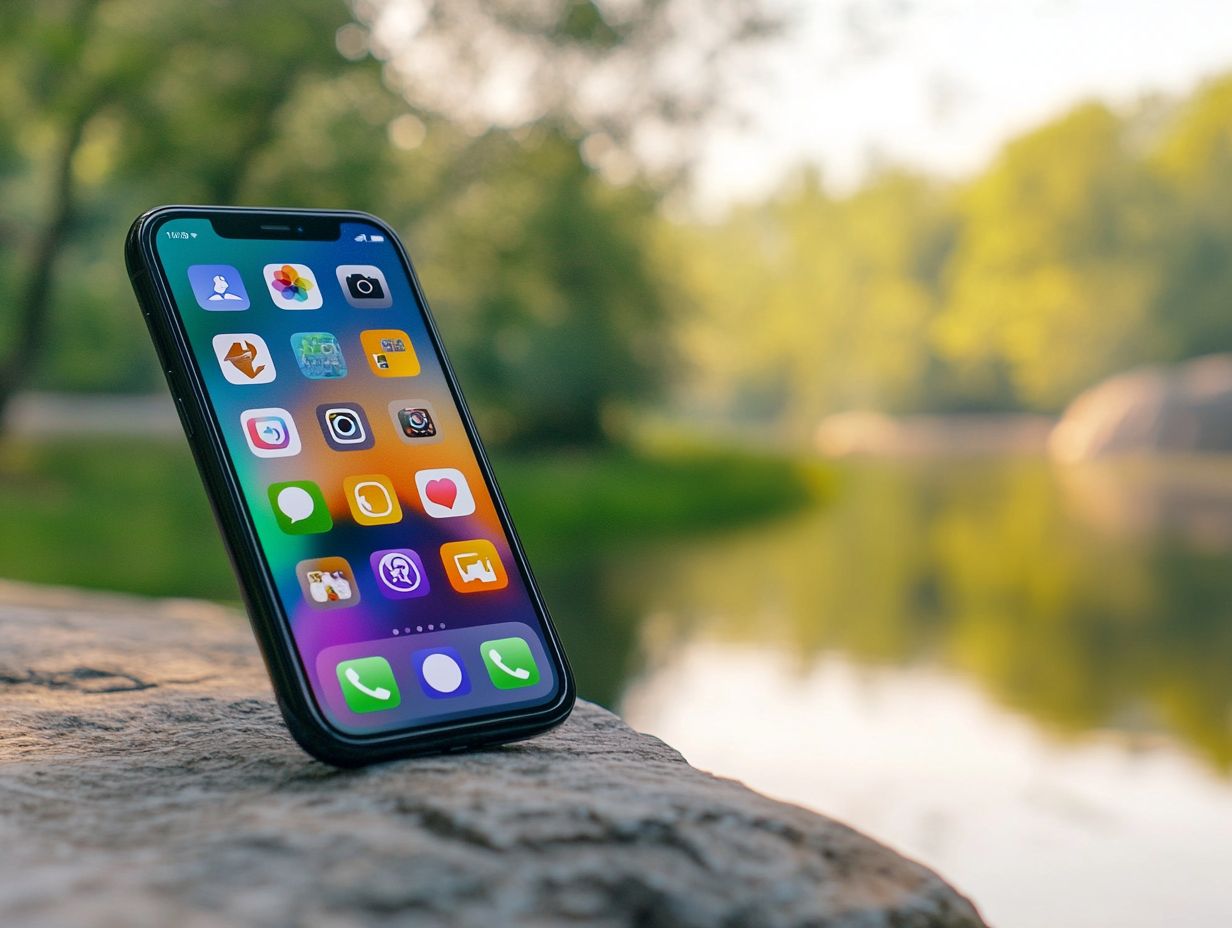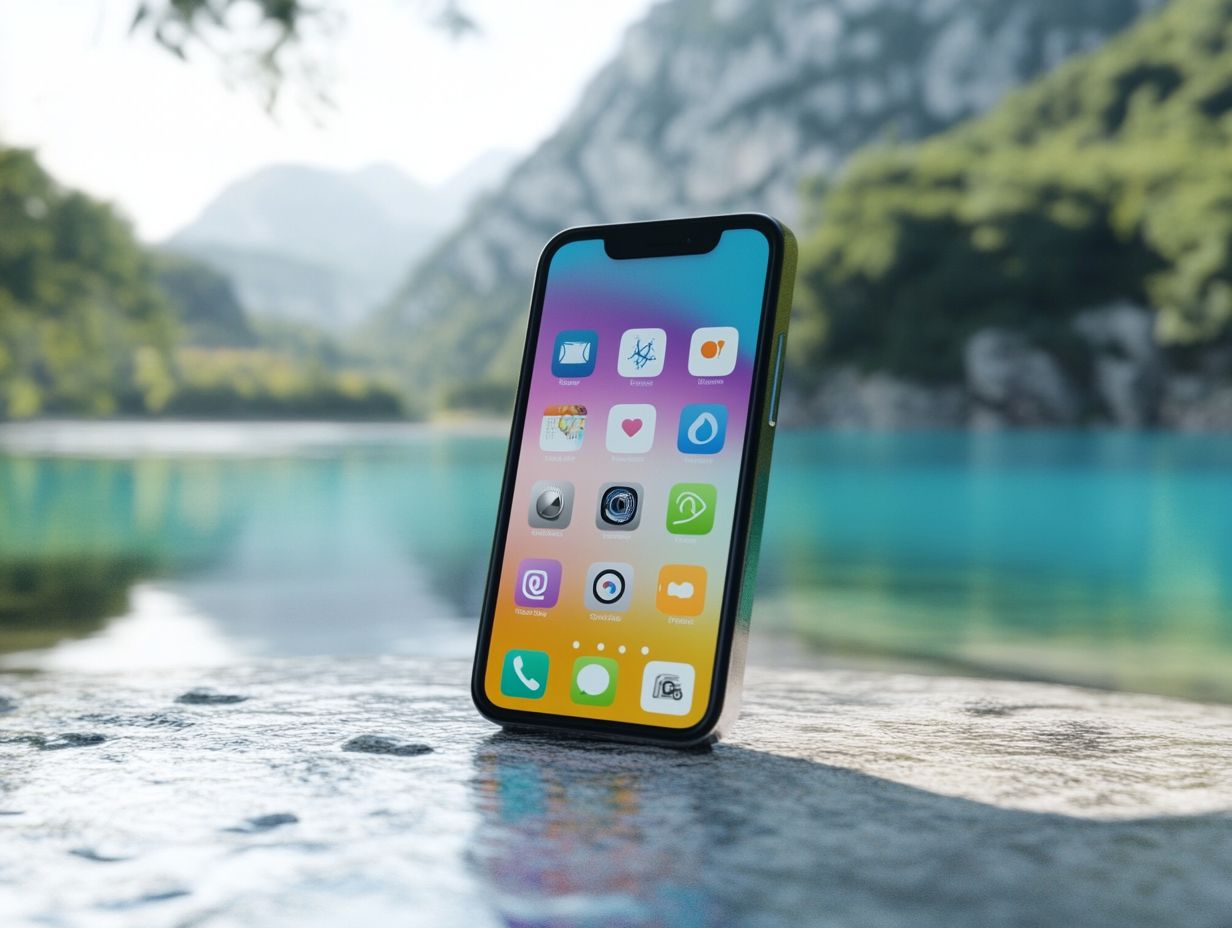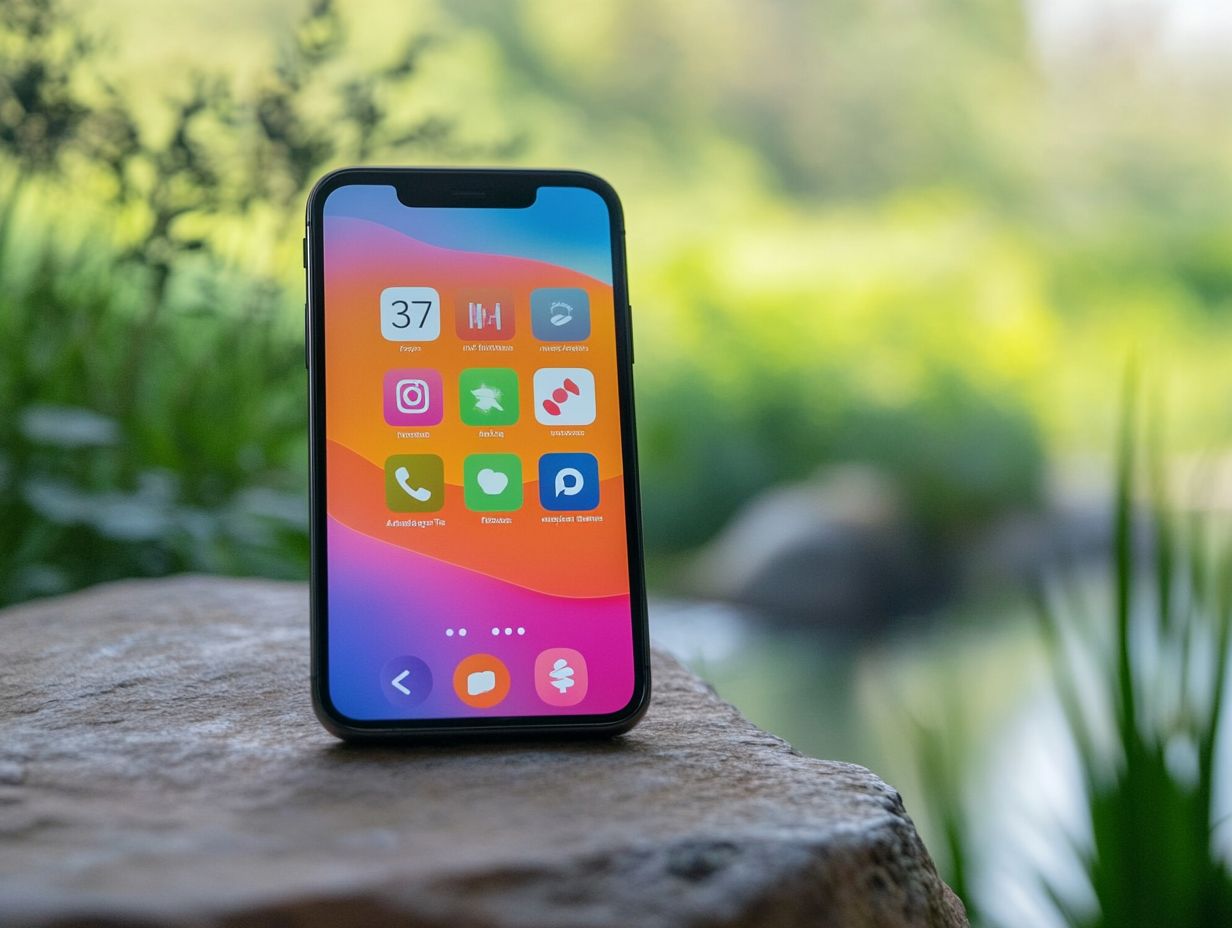5 Apps for Building Personal Resilience
In today s fast-paced world, personal resilience is more vital than ever. It s all about bouncing back from challenges while keeping your mental well-being intact. Thankfully, technology supports you on this journey.
This article delves into five innovative apps designed to enhance your resilience. From the mindfulness practices offered by Headspace to the game-based strategies found in SuperBetter, each app has unique features and benefits that cater to your needs.
You will find insights on how these tools can effortlessly integrate into your daily routine, along with tips for cultivating resilience. Discover how to boost your mental resilience today!
Contents
- Key Takeaways:
- 1. Headspace: Meditation and Mindfulness
- 2. Happify: Science-Based Activities to Boost Happiness
- 3. Calm: Sleep, Meditation, and Relaxation
- 4. Moodfit: Mood Tracking and Mental Health Tools
- 5. SuperBetter: Game-Based Approach to Building Resilience
- What Is Personal Resilience and Why Is It Important?
- Frequently Asked Questions
Key Takeaways:

- Incorporating mindfulness and meditation into your daily routine helps build personal resilience and reduces stress levels.
- Science-backed activities and games effectively boost happiness and build resilience.
- Tracking moods and utilizing mental health tools can aid in managing stress and enhancing resilience.
1. Headspace: Meditation and Mindfulness
Headspace stands out as a top meditation app crafted to bolster your mental resilience. It helps you manage stress and anxiety through structured meditation courses and guided practices. In a world where psychological conditions often arise from daily pressures, tools like Headspace are critical for nurturing emotional well-being.
With its diverse array of meditation series and mindfulness techniques, the app equips you with effective strategies to navigate your emotional landscape. Dive into practices rooted in positive psychology, giving you the power to cultivate self-awareness and enhance your overall mental health.
Many users have reported significant transformations, including reductions in anxiety and improved emotional regulation after integrating regular sessions into their routines. Research backs these experiences, revealing that consistent use of Headspace enhances your ability to cope with stress and fosters a profound sense of inner calm.
2. Happify: Science-Based Activities to Boost Happiness
Happify provides you with science-backed activities designed to elevate your happiness and enhance your mental well-being. Through engaging exercises, you’ll find strategies that promote resilience and equip you to tackle stress effectively. The platform masterfully combines cognitive behavioral therapy, a method to change negative thinking patterns, and positive psychology, offering you a comprehensive toolkit for emotional self-awareness.
As you explore various interactive games and guided meditations, you ll discover tools crafted to help you navigate daily challenges. These activities foster self-reflection and empower you to cultivate a more positive mindset.
Users have shared experiences of reduced anxiety and improved emotional regulation after regularly engaging with the platform. Happify collaborates with mental health professionals to ensure that its methods are effective and validated, employing evidence-based practices that resonate with you on your mental health journey.
3. Calm: Sleep, Meditation, and Relaxation
Discover how Calm can transform your mental health journey! Calm is a versatile app that blends sleep, meditation, and relaxation techniques. It gives you the power to manage stress and enhance your mental health.
If you’re looking to cultivate mindfulness and improve your emotional well-being, Calm offers an extensive array of resources tailored specifically for stress symptoms and anxiety management.
One of the standout features includes soothing sleep stories narrated by calming voices, whisking you away to tranquil settings that help you drift off peacefully. The app also provides guided meditations suitable for both beginners and seasoned practitioners, offering a structured pathway to relaxation and self-discovery.
You can dive into relaxation exercises designed to reduce tension and boost focus, making it much easier to navigate the daily challenges life throws your way. By incorporating these techniques into your workplace routine, you can experience significant improvements in mental clarity and resilience, ultimately fostering a healthier and more productive work environment.
4. Moodfit: Mood Tracking and Mental Health Tools

Moodfit is an innovative app designed to elevate your emotional well-being through mood tracking and mental health tools. It gives you the power to enhance your self-reflection and engage in targeted interventions for stress management.
Moodfit helps you identify patterns in your mood and stress symptoms, becoming a vital resource for developing effective coping strategies. The app includes a complete mood journal where you can record your daily emotions and reflect on your triggers, offering valuable insights into your mental health trends over time.
With innovative mental health insights, Moodfit helps you understand how factors influence your mood. Personalized recommendations provide tailored strategies and activities that align with your specific needs and circumstances.
Armed with these tools, you can build resilience and adopt a proactive approach to managing your mental health, ultimately leading to a more balanced and fulfilling life.
5. SuperBetter: Game-Based Approach to Building Resilience
SuperBetter offers you a game-based approach to building resilience, inviting you to confront the challenges of stress and anxiety through engaging activities and a supportive community. This innovative method transforms resilience training into an enjoyable experience while harnessing the principles of positive psychology to enhance your emotional self-awareness.
By incorporating tasks and quests that mirror real-life challenges, the platform gives you the power to actively manage your emotional states while instilling a sense of accomplishment.
You can connect with a network of peers who not only boost your motivation but also provide a safe space to share experiences and strategies. With features like progress tracking and rewards for overcoming obstacles, SuperBetter reinforces a positive mindset, allowing you to translate your in-game successes into real-world productivity and effective stress management.
This approach paves the way for improved workplace outcomes and greater mental clarity.
What Is Personal Resilience and Why Is It Important?
Personal resilience embodies your ability to adapt and cope with stress, adversity, and psychological challenges, playing a crucial role in safeguarding your mental health and emotional well-being. In today s landscape, where issues like COVID-19 and workplace stress are all too common, nurturing resilience becomes imperative for boosting workplace productivity and enhancing employee engagement.
By honing this ability to bounce back from life’s challenges, you can easily navigate its inevitable highs and lows with greater ease. Mental health interventions such as cognitive-behavioral therapy (CBT), which is a type of therapy that helps you understand and change your thoughts and behaviors, mindfulness practices, and support groups have been proven to strengthen resilience.
For healthcare professionals, resilience training programs can lead to reduced burnout rates and improved patient care. In high-stress environments, these individuals gain immense benefits from mastering techniques that bolster their coping skills while preserving their mental and emotional health.
How Do These Apps Help with Building Personal Resilience?
Explore the fantastic tools these mental health apps provide to boost your resilience. These apps offer a remarkable array of resources designed to help you build personal resilience. For those looking for structured guidance, consider checking out 5 online courses for building resilience. With coping strategies, mindfulness practices, and ways to manage stress at your fingertips, you can actively engage in your mental wellness journey by integrating simple psychological techniques with cutting-edge digital health technology.
Among the standout features, guided meditations allow you to cultivate a sense of calm and clarity. This equips you to navigate daily stressors with greater ease. The mood tracking features provide essential insights into your emotional patterns, fostering a deeper understanding of your triggers and responses.
The community support elements create a safe space for you to connect with others, share experiences, and gain encouragement especially invaluable during challenging times. Collectively, these functionalities empower you not only to enhance your emotional self-awareness but also to develop effective coping skills that contribute to long-term mental resilience.
What Are the Key Features of Each App?

Each mental health app you encounter boasts unique key features designed to elevate your mental well-being. These range from customizable meditation sessions to mood tracking and community-based support systems. By tailoring their services to your individual needs, these apps empower you to take charge of your stress and emotional health.
For example, one app shines with its interactive journaling feature, encouraging you to process your thoughts and feelings daily. Another incorporates AI-driven prompts that adapt based on your feedback, making the experience distinctly personal.
Users consistently commend these apps for cultivating a sense of belonging and connection through forums where you can share experiences and coping strategies. Many individuals have observed substantial improvements in their daily well-being, attributing their growth to the structured routines and professional guidance that bolster their mental resilience, including engaging in creative outlets to enhance resilience.
This delightful fusion of technology and personal development creates a uniquely supportive environment for navigating life s challenges with confidence.
Are These Apps Suitable for Everyone?
While mental health apps offer valuable resources, their effectiveness really depends on your individual needs, preferences, and specific psychological conditions. It s crucial to consider your personal circumstances and consult with mental health professionals when integrating these tools into your daily routine.
Age can significantly influence which app suits you best. For example, if you re younger, you might lean towards interactive, gamified experiences that resonate with your digital lifestyle. On the other hand, if you re older, you may appreciate straightforward interfaces that provide clear guidance.
Your mental health history also plays a role in your choice. If you experience anxiety, mindfulness-focused apps could be particularly beneficial for you, while those dealing with depression might find mood tracking and cognitive behavioral therapy resources more helpful. Cognitive behavioral therapy, a method to change negative thought patterns, can be very helpful.
Insights from mental health professionals emphasize that customizing your app usage based on these factors enhances their effectiveness. Don t wait start exploring these tools today to enhance your mental wellness!
How Can These Apps Be Incorporated into Daily Life?
Incorporating mental health apps into your daily life can significantly enhance your stress management and emotional self-awareness. These apps offer accessible tools for meditation, mood tracking, and resilience-building challenges that can make a real difference. By developing a consistent routine for using these apps, you can improve your therapy practices and overall mental wellness.
To truly harness these resources, start by setting daily reminders for simple activities like meditation or mood check-ins. This can help you seamlessly integrate them into your schedule. For example, choosing a specific time like early morning or just before bedtime can help you establish a habit.
You may encounter barriers such as forgetfulness or a hectic lifestyle. To overcome these challenges, consider partnering with a friend for accountability or exploring app features that send you push notifications. Technical issues might also arise now and then; ensuring your app is regularly updated and exploring customer support options can help you navigate these hurdles and keep your engagement high.
What Are Some Other Ways to Build Personal Resilience?
Besides using mental health apps, you have a wealth of options to cultivate personal resilience. Engaging in mindfulness practices, seeking peer support, and participating in techniques to build emotional resilience can significantly enhance your emotional well-being. These approaches can provide you with effective coping strategies to navigate stress.
Incorporating physical activities such as yoga, hiking, or even a simple daily walk can elevate your mood and release built-up tension. Therapy options, whether individual or group-based, offer a safe haven for exploration and healing. Support groups, in turn, foster a sense of belonging that can be incredibly grounding.
By blending these approaches, you not only fortify your mental resilience but also cultivate a vibrant sense of community. This interconnectedness and support are essential in building resilience. It encourages you to share experiences and learn from others, ultimately enriching your journey toward improved mental health.
Frequently Asked Questions

What are some recommended apps for building personal resilience?
Some popular apps for building personal resilience include Headspace, Calm, Happify, Moodfit, and SuperBetter, along with a variety of additional tools found in 5 resources for building resilience.
What is the purpose of using these apps?
The purpose of using these apps is to help individuals develop coping skills, manage stress and anxiety, and improve overall mental well-being.
Are these apps suitable for anyone?
Yes, these apps are suitable for anyone looking to improve their resilience and emotional well-being. They can be used by people of all ages and backgrounds.
How do these apps work?
Each app uses different techniques, such as mindfulness, a type of therapy that helps you change negative thoughts, positive psychology, and gamification to help individuals develop resilience and improve their mental health.
Do these apps require a subscription?
While some apps offer a subscription for additional features, many of them have free versions with basic tools and exercises that can be helpful for building emotional resilience.
Can these apps replace therapy or professional help?
No, these apps are not a replacement for therapy or professional help. They can be used as a supplement to therapy or as a self-care tool, but they should not be used as a substitute for seeking professional help when needed.
Start your journey to better mental health today! Download one of these apps or visit a reliable mental health resource for more information.






